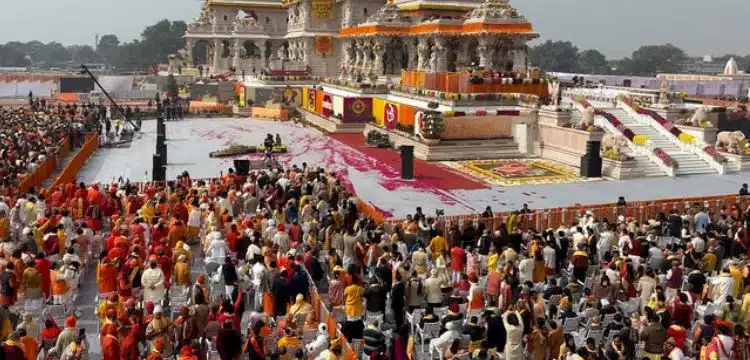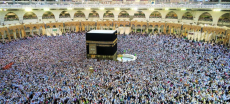[vc_row][vc_column][vc_column_text dp_text_size=”size-4″]Indian Prime Minister Narendra Modi, on Monday, officially inaugurated a grand Hindu Ram temple in Ayodhya, marking a historic moment at the site where the Babri mosque once stood before being demolished by Hindu extremists in the 1990s.
The inauguration ceremony, known as Pran Pratishtha, took place in the sensitive city, and it was attended by a significant number of guests, including celebrities from the film industry and cricketers. The event, however, saw the notable absence of most of the Indian opposition, which chose to boycott the inauguration. Their stance was grounded in the belief that the ruling Bhartiya Janta Party (BJP) was leveraging the temple inauguration to gain favor with voters, especially with general elections on the horizon in the coming months. Critics argued that the BJP might seek votes by invoking the temple as a significant electoral strategy, given that 80% of the Indian population identifies with the Hindu religion.
Read more : Indian PM Modi Inaugurates and Addresses GPAI Summit 2023 held in Delhi
The construction of the temple, with a staggering cost of $217 million, was reportedly funded through private donations collected by the temple trust. The ceremony was a spectacle broadcast on television, capturing Modi engaged in religious rituals within the temple premises, accompanied by priests and Mohan Bhagwat, the head of Rashtriya Swayamsevak Sangh (RSS).
It’s worth noting that, at this point, only the ground floor of the Hindu temple has been opened to the public. The completion of the entire structure is anticipated by the end of the year, marking a significant milestone in the long-standing dispute over the Ayodhya site.
The backdrop of this ceremony is fraught with historical tension. The demolition of the 16th-century Babri mosque in the 1990s had triggered nationwide riots, resulting in nearly 2,000 casualties. The repercussions of that event continued to echo through legal proceedings. In September 2020, a court in the northern Indian state of Uttar Pradesh acquitted all 32 individuals, including former Deputy Prime Minister L. K Advani, who were implicated in the attack and destruction of the Babri mosque. This legal development added another layer of complexity to the already contentious issue, and the construction and inauguration of the Ram temple now stand as a transformative chapter in the region’s history.
As the temple inauguration takes center stage, it becomes a symbol not only of religious significance but also of the political dynamics shaping the Indian landscape. The decision by a significant portion of the opposition to boycott the event underscores the divisive nature of this development and its potential impact on the upcoming political landscape in India. The completion of the temple later this year will undoubtedly mark a watershed moment in the history of Ayodhya, carrying profound implications for the nation’s identity and social fabric.[/vc_column_text][/vc_column][/vc_row]











